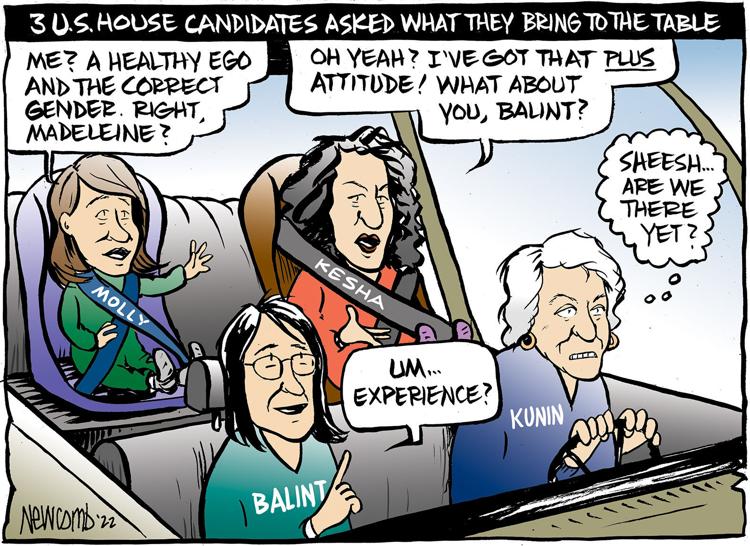Tim Newcomb’s cartoon in the January 19th edition of the Times Argus compares the three candidates running for the US House of Representatives. It appears to imply that experience is the most important factor for voters to consider. But whatever the primary message of this cartoon is supposed to be, the implicit, negative messages it sends about these women, and women and people of color in general, are glaring.

- The candidates are depicted as a car full of bickering girls.
- The Lieutenant Governor of Vermont is shown as a toddler in a car seat.
- A sitting state senator and former state representative, a woman of color, is drawn as a child with exaggerated facial features in a booster seat—in the back of the car.
- The candidates in the back seat are labelled “Molly” and “Kesha” while the candidate in the front and the driver are labelled “Balint” and “Kunin.”
- Vermont’s first and only woman governor is depicted as a harried parent tired of her annoying children.
Yes, it’s just a cartoon. But I can’t unsee the infantilizing of two of the most successful women in Vermont politics today. I can’t unsee the dismissive treatment of women candidates for the US House as whiny little girls. And I really can’t unsee placing the one candidate who is a woman of color in the back seat and exaggerating her lips and nose. The things that are apparently supposed to be funny about this cartoon are actually entrenched stereotypes and tropes that reinforce implicit bias against women and people of color.
I also can’t help but remember that just last year the Vermont media was called out for its gender bias in an open letter from dozens of prominent women, and news outlets publicly pledged to do better. This cartoon doesn’t do better.
A lot of readers are probably thinking, oh come on, it’s just a cartoon, stop being so sensitive, it’s supposed to be funny. It’s true that political cartoonists have a long and colorful history of tweaking the noses of politicians, poking holes in arguments, shining a bright but unflattering light on government, and exaggerating behavior and appearance through caricature. And this particular cartoonist has made us laugh and cringe at ourselves and our state for decades.
But I can’t help thinking about all the Vermonters opening their papers or going online to get the news and seeing this cartoon. Are they thinking about the importance of satire in political discourse? Probably not. I’m guessing a lot of people saw that cartoon and thought, “Yep. He nailed it.” Because this cartoon just confirms all the negative biases that exist about women, people of color, and women who run for office, all in one tidy little scene.
I’m also thinking about all the amazing women currently serving in office right now throughout Vermont, and those who are thinking of running for election on Town Meeting Day and in November. They’ll also say, “Yep. He nailed it,” but for a different reason: they’ll see that cartoon as more of the same dismissive, condescending, stereotypical treatment of women and people of color in politics. And then they’ll sigh, and carry on doing their good work.
Political cartoons are an important part of our public discourse. They’re supposed to get a rise out of us. We shouldn’t take them literally—they’re supposed to be funny. It’s a joke, right?
We get it. But the implicit, disrespectful messages about younger women candidates and candidates of color? We get those too, loud and clear.